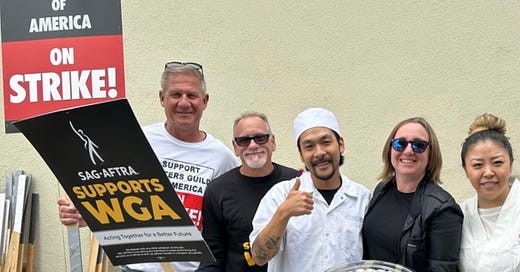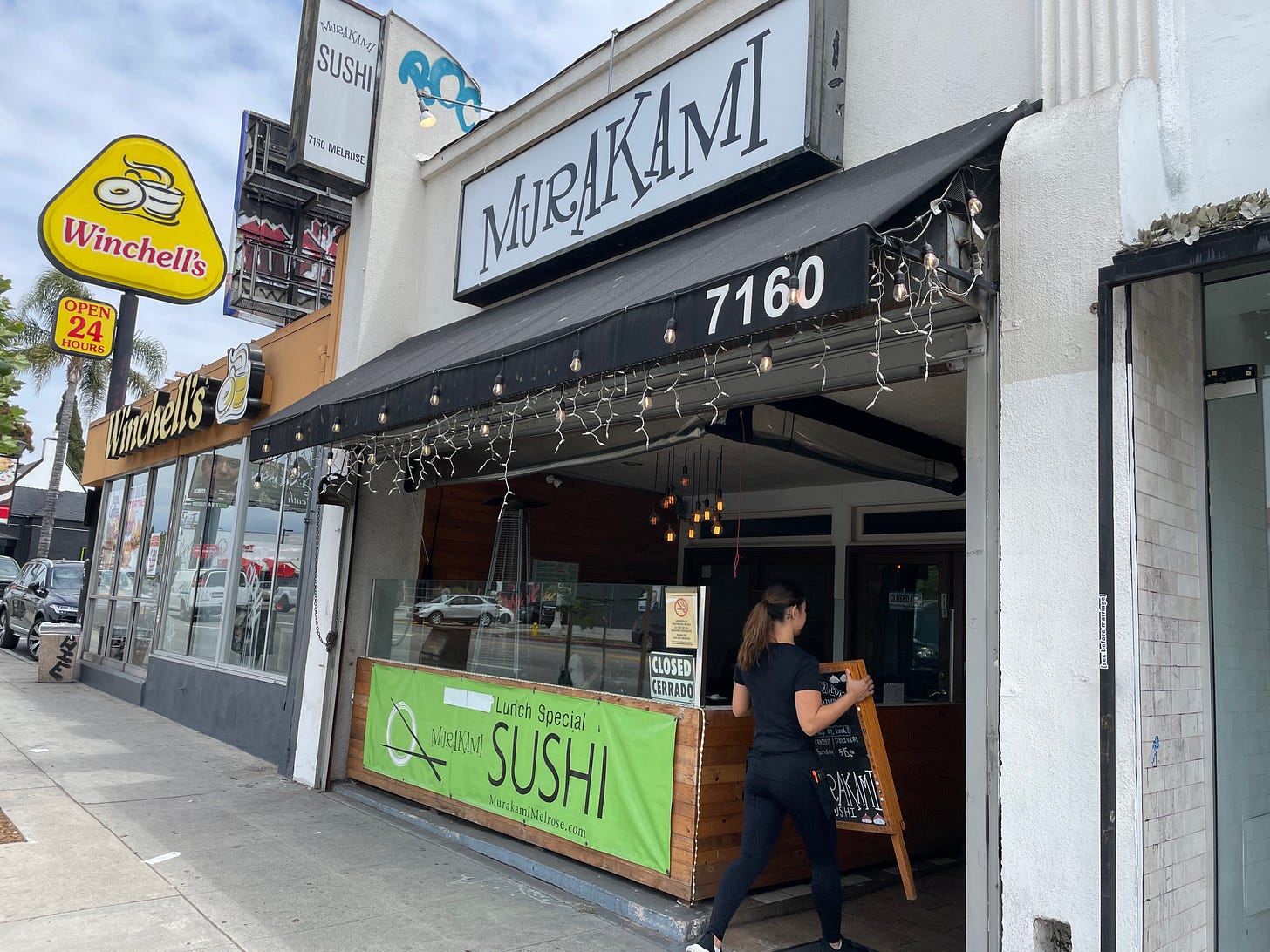Daily Digest: Carey, Garner Feed Writers as Fave Studio Restaurants Take a Hit
➕ Drew Carey drops $10k a week on Big Boy's meals; pointing fingers at business affairs

At around 1:30 p.m. Tuesday, Murakami Sushi was unusually quiet. A handful of diners chattered quietly over lunch where there would normally be full tables of six or eight. The restaurant on Melrose — a stone’s throw from the Paramount lot and CBS Television City— has seen the after-work and lunchtime crowd dwindle significantly since the Writers Guild strike started on May 2 and writers rooms shut down. Now that most productions have hit the brakes as writers set up picket lines that Teamsters won’t cross, it’s even quieter.
The sushi joint’s takeout orders have plunged by around 50 percent. Already squeezed by inflation and concerns of a recession, the current work stoppage isn’t helping local businesses near studio lots. Even ever-popular Milk Bar down the street is seeing less foot traffic as a result, the cashier at the counter told me, though the bakery has been impacted to a lesser degree.
Still, Murakami owner Tomoko Bright cheerfully brought California rolls, shrimp tempura rolls and spicy tuna crispy rice to striking writers at Paramount that morning. She remembers the writers and industry folk who made sure to patronize her restaurant when times were even tougher.
“I feel like they support[ed] us [during] the pandemic,” she told me. “They come a lot to us, so now I can do something — they say they don’t get paid. I see some get free pizza, so I thought, ’Why not?’”
Bright isn’t the only one sympathetic to the cause, even if her business is being hit. There’s an entire running list of restaurants across Los Angeles offering discounts to WGA members, curated by TV writer and local strike captain Deanna Shumaker.
Some are even comping entire meals. Thanks to Drew Carey, WGA members can dine in for free — tip included — at Big Boy’s diner in Burbank and Swingers on Beverly for as long as the strike continues. Big Boy’s assistant general manager Gencer Pedrigala told me this morning that Carey’s tab is running up around $2,000 a day, or $10,000 a week, since the comedian and actor first spread the word two weeks ago.
“Everyone really appreciates it,” he says. “They’re excited Drew Carey is doing that and at the end of the day it brings us business as well. We’re grateful.”
Meanwhile, I spotted Jennifer Garner today at Fox, who fueled fellow picketers with Fresh Brothers pizza. Even if it’s not in a restaurant, everyone’s got to eat.
But for how long suffering restaurants will be able to hold out as the strike goes on, however, is a question mark. What happens to Murakami if this work stoppage lasts through the summer, I asked Bright? Her eyes widened.
“That’s scary,” she said.
Elsewhere on The Ankler
Ever wondered who created and crafted the deal terms that led to writers going on strike? It’s the same group of people who can get us out of this mess, too, says Entertainment Strategy Guy. In today’s column for The Ankler, he goes deep on why business affairs are the most influential people in Hollywood. They’re also the same group responsible for designing some of the deal points that have become the biggest kerfuffles in entertainment, he says, such as:
Buying out the back-end of scripted TV shows in streaming. Since Netflix doesn’t want to share ratings data with talent, nor do they want to share profits, they had to devise contracts that paid higher upfront fees in the first place. Business affairs teams did the heavy lifting on these deals. As a reminder, in an interview with The Ankler, UTA head Jeremy Zimmer basically blames “the Netflix model” for a lot of current problems in streaming and talent dissatisfaction. I’ll add, HBO faced this challenge with residuals back in the early 2000s when they wanted to replay shows around the clock.
ESG also attributes biz affairs with the following:
The cost-plus producing model. Uber-producer Jason Blum has mentioned how the “cost-plus production model” — where a streamer pays production costs plus some number, 10-30 percent — basically incentivizes him to ramp-up costs, when, as an indie producer, he was notoriously spendthrift. Again, business affairs folks crafted these deal points.
Read the full story on The Ankler, with a subscription.
Today’s Strike News
Boston University, where David Zaslav was recently heckled during his commencement address, is decidedly on the Warner Bros. Discovery chief’s side, as school president Robert A. Brown accused his students of bowing to “cancel culture” with their actions. Make sure to read the comments. (BU Today)
Netflix shareholders voted against compensation packages for top execs including Ted Sarandos and Greg Peters, just days after the WGA sent a them a letter urging them to reject the “Say on Pay” proposal. (The Hollywood Reporter)
So much for déjà vu: the WGA sent out a message to its members today saying that this will not be a repeat of 2008, as the studios’ “divide and conquer” strategy will not work thanks to a harmony among the unions that wasn’t present last strike. (Variety)
As the strike enters its second month here in the U.S., writers in India — where an OTT boom is underway — have reported discontent, with 63 percent believing they are not paid fairly. (Deadline)
Picketing has extended all the way down to the Peach State, where strikers managed to shut down filming on Hysteria!, an upcoming Peacock series that was shooting in Atlanta. (The Hollywood Reporter)
A new report has suggested that three streamers — Max, Paramount+, and Peacock — are best-equipped to handle the effects of the strike, as the trio all have a wealth of unscripted content. (Forbes)
Though The Batman Part II was slated to begin filming in November, the strike has pushed the start date back four months to March of next year. (Collider)
Picketers of the Day
Seen at the Fox lot for the Greta Gerwig Appreciation Day picket.
Additional reporting by Matthew Frank








